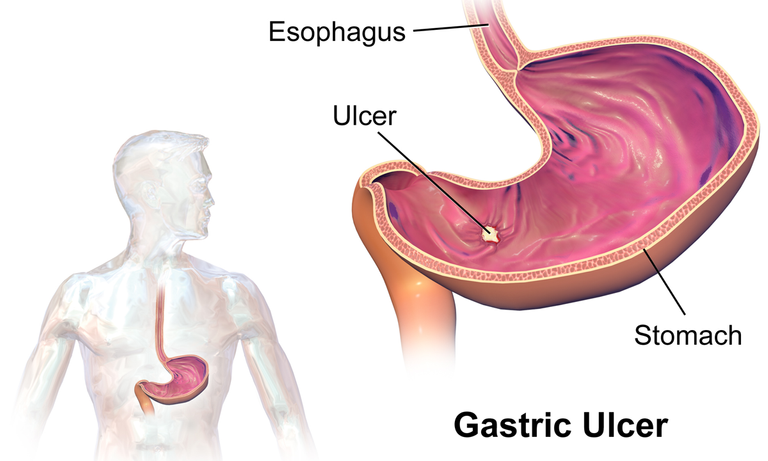Unraveling the Enigma: Why the Cause of Ulcer Remains a Medical Mystery

By BruceBlaus - Own work, CC BY-SA 4.0, https://commons.wikimedia.org/w/index.php?curid=44923645
I recently witnessed a family friend suffered from a terrible crises. It all started with a complaint of stomach ache which seemed to be getting worse every minute. I thought it would be one of those normal stomach pains that go away on their own until this family friend started throwing up and wriggling in terrible agony. The scariest part of the encounter was that the vomit did not look anything like normal. It was filled with green bile. He was rushed to the hospital, spent some days on drips and IV infusions, before being eventually discharged. The diagnosis was an ulcer.
What caused it?
Introduction
Ulcers, those painful sores that can afflict various parts of the digestive tract, have plagued humanity for centuries. Despite significant advances in medical science, the underlying cause of ulcers has remained an enigma, shrouded in mystery. In this article, we delve into the perplexing world of ulcers, exploring the historical context, current understanding, and the reasons behind why this condition continues to baffle medical researchers worldwide.
A Historical Perspective
The history of ulcers is steeped in myth and misunderstanding. Ancient civilizations attributed these painful sores to divine punishment or malevolent spirits, leading to bizarre and ineffective treatments. The Greeks believed ulcers were caused by an imbalance of bodily humors, while medieval physicians prescribed various concoctions and remedies, often to no avail.
Advances in Medical Knowledge
Over time, medical knowledge and practices evolved, leading to the identification of the bacterium Helicobacter pylori in the early 1980s. This groundbreaking discovery challenged conventional wisdom and revealed a possible link between ulcers and bacterial infection. However, the story turned out to be more complex than initially thought.
The Helicobacter pylori Conundrum
Researchers found that Helicobacter pylori indeed played a role in the development of certain ulcers, particularly those affecting the stomach lining. This led to a medical revolution, as treatments with antibiotics became effective in managing these cases. However, it did not explain all types of ulcers, leaving researchers with more questions than answers.
Non-Helicobacter pylori Ulcers
While Helicobacter pylori explained some ulcers, a significant number of cases remained untouched by the bacterium. Non-steroidal anti-inflammatory drugs (NSAIDs) like aspirin and ibuprofen were identified as a potential cause of these ulcers. The regular use of NSAIDs could irritate the digestive tract lining and trigger ulcer formation. Yet, even after accounting for these factors, a substantial number of ulcers still lacked a clear etiology.
Stress and Lifestyle: The Blame Game
For many years, stress and lifestyle factors were often blamed for ulcers. It was commonly believed that intense stress or a spicy diet could lead to the development of these painful sores. While these factors could exacerbate symptoms, they were not the root cause of ulcers.
The Advent of Acid
Another pivotal discovery related to ulcers was the role of stomach acid. Acid is essential for digestion, but when its production becomes excessive or imbalanced, it can harm the delicate lining of the digestive tract. Acid-reducing medications, such as proton pump inhibitors (PPIs), offered relief to those suffering from ulcers. However, even after controlling acid levels, some individuals still experienced recurring ulcers, indicating that acid was not the sole culprit.
The Immunological Puzzle
In recent years, researchers have turned their attention to the immune system's role in ulcer development. Inflammatory responses, autoimmune reactions, and other immune-related factors have been considered as potential contributors. Nevertheless, the precise mechanisms that trigger these immune responses and their correlation with ulcers remain a riddle yet to be solved.
Genetics and Susceptibility
Genetics have also been implicated in the susceptibility to ulcers. Some individuals may inherit a genetic predisposition that makes them more prone to developing these sores. However, this genetic component is not present in all ulcer cases, and much research is still needed to fully understand the interplay between genetics and ulcer formation.
Challenges in Diagnosis and Treatment
The elusive nature of ulcers poses significant challenges in both diagnosis and treatment. Given the diverse range of factors that may contribute to ulcer development, pinpointing the exact cause for an individual patient can be a complex task. Additionally, treatment approaches that work for some patients may be ineffective for others, making personalized and effective treatment plans difficult to establish.
Conclusion
As medical knowledge advances, the cause of ulcers remains a medical mystery that continues to baffle researchers and healthcare professionals alike. While significant strides have been made in understanding the role of Helicobacter pylori, NSAIDs, acid, and the immune system, there are still countless unanswered questions. The multifaceted nature of ulcers calls for continued research and collaboration among experts worldwide. Until the day we unravel the full mystery, medical professionals will continue to focus on managing symptoms, providing relief to patients, and striving to unlock the secrets behind this ancient affliction.
Thanks for your contribution to the STEMsocial community. Feel free to join us on discord to get to know the rest of us!
Please consider delegating to the @stemsocial account (85% of the curation rewards are returned).
You may also include @stemsocial as a beneficiary of the rewards of this post to get a stronger support.
Congratulations @hibadurahmon! You have completed the following achievement on the Hive blockchain And have been rewarded with New badge(s)
Your next target is to reach 400 upvotes.
You can view your badges on your board and compare yourself to others in the Ranking
If you no longer want to receive notifications, reply to this comment with the word
STOPCheck out our last posts:
Congratulations @hibadurahmon! You received a personal badge!
You can view your badges on your board and compare yourself to others in the Ranking
Check out our last posts: